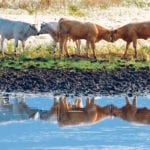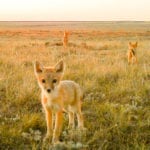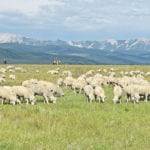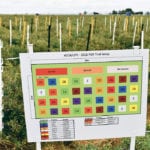Shortening the distance between nodes on an alfalfa plant reduces its height but produces the same number of flowers
BROOKS, Alta. — Researchers are testing four types of plant growth regulators on alfalfa this year to gauge their potential for shorter stands and reduced lodging. Brad Alexander, in charge of research and extension with the Alberta Alfalfa Seed Commission, told growers on a July 24 summer tour that PGRs had shown promise in greenhouse […] Read moreStories by Barb Glen

Heat stress requires extra animal care
Prevent heat stress by providing adequate water for outdoor dwellers and air movement for indoor dwellers
Dairy cattle and pigs breathe harder, beef cattle lie around and eat less, and all of them drink lots of water when temperatures rise above 25 C. Those physical responses aren’t surprising but the potential for heat stress in livestock should be monitored, according to veterinarians. Cooler nights are the saving grace for most western […] Read more
Swift foxes found in Alberta
At least five swift foxes are now resident in southeastern Alberta, a species that was declared locally extinct within Canada in the 1930s. Cameras erected on property managed by the Nature Conservancy of Canada photographed the foxes in an area south of Medicine Hat and about 50 kilometres west of the Saskatchewan border in late […] Read more
Producers may be forced to look for strychnine alternatives
Health Canada proposes to end the use of strychnine to control ground squirrels and is seeking public input on the matter until Sept. 27. The proposal stems from a regular review of pesticides under the Pest Management Regulatory Agency. In its consultation document, Health Canada said strychnine kills ground squirrels but it also kills non-target […] Read more
Traces of PED a ‘serious heads up’ for Sask. hog farmers
Two positive samples of the virus were found last week in the province on a livestock trailer and a truck wash
The truth is out there: evidence of porcine epidemic diarrhea virus continues to appear. Two positive samples found last week in Saskatchewan serve as a reminder that hog producers should be vigilant about biosecurity. No Saskatchewan pigs had contracted the virus as of July 30. The samples were found in a truck wash and on […] Read moreMilitary base makes fire aftermath promises
Canadian Forces Base Suffield is taking steps to be a better neighbour after causing a fire last fall that destroyed livestock, pasture, feed, fences and outbuildings outside the base. The Sept. 11-12 blaze, started when base personnel detonated an artillery shell during dry, windy conditions, burned about 90,000 of acres to the north and east […] Read more
Alfalfa seed crop yields up, prices down
This year’s alfalfa seed crop looks to be average to somewhat above average, based on its appearance, but surplus seed from previous good crops has lowered prices. “I’m hearing guys thinking that its going to be another above average year, but at the same time a lot of guys have ripped out acres and they’re […] Read more

Sheep splurge on spurge on southern Alberta ranch
LUNDBRECK, Alta. — The 65,000-acre Waldron Grazing Co-operative has 600 weed pickers. Leafy spurge, an invasive weed unpalatable to cattle, was taking over parts of the ranch so intervention was required. The weed pickers are sheep owned by the nearby Livingstone Hutterite Colony. Instead of spending thousands of dollars on weed control, which failed to […] Read more

Producers reject U.S. beef boycott
Consumers have been urged on social media to stop buying American beef because of recent U.S. trade actions
Boycotting American beef as a retaliatory response to U.S. trade sanctions would harm rather than help Canadian producers, says the Canadian Cattlemen’s Association. Since U.S. President Donald Trump’s administration imposed tariffs on Canadian steel and aluminum, prompting Canada to impose its own new tariffs as of July 1, social media has been alive with urgings […] Read moreExclosure demonstrates value of grazing
A patch of grassland in Alberta that hasn’t been grazed for 30 years has less carbon and diversity than grazed prairie
LUNDBRECK, Alta. — A fragment of the 65,000-acre Waldron Grazing Co-operative has been fenced off for 30 years in an “exclosure” protected from grazing animals and man-made disturbance. Compared to the grassland just outside the wire, it has fewer plant species and long, weathered grass. Waldron manager Mike Roberts bent down to search through the […] Read more




